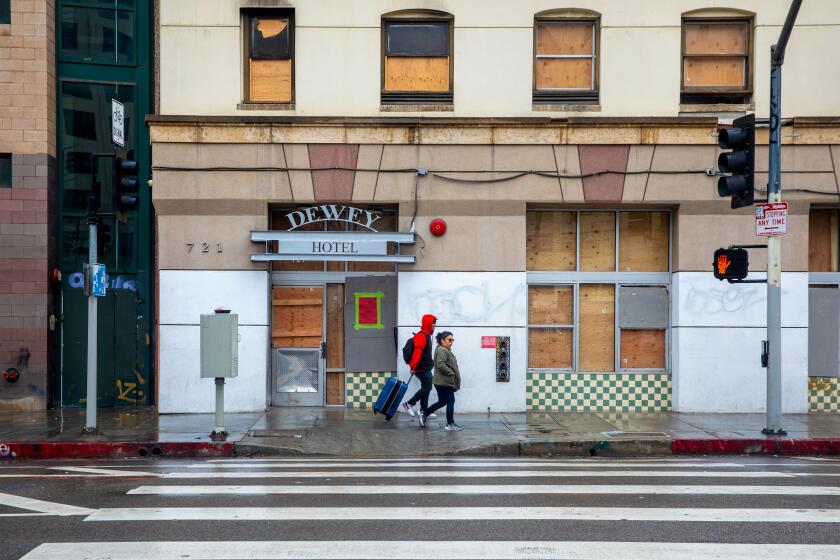
- Share via
The Trails End Mobile Home Park in Fresno was a shelter of last resort for many of its residents — single parents, retirees, day laborers, people struggling with disabilities or simply to get by. Then the city declared its conditions unsanitary and asked a judge to hand control to a receiver named Mark Adams to improve the property. Two years later, a third of the spots are vacant and the remaining tenants face eviction.
In the Coachella Valley, Adams acted as receiver over a community of 4,000, primarily migrant farmworkers. He saddled the receivership with $220,000 in debt, a judge removed him and the squalor remained years after he was gone.
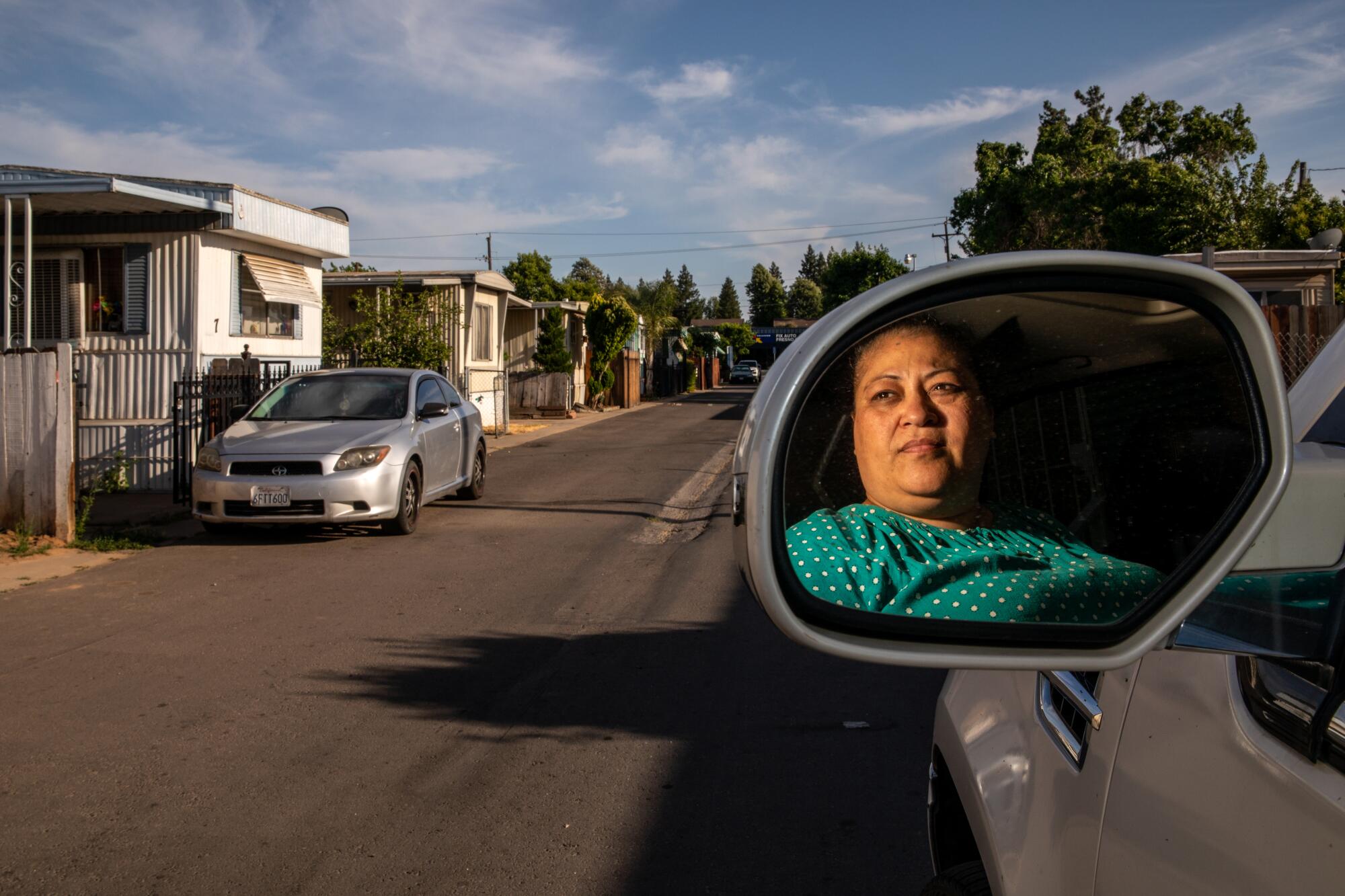
In East Los Angeles, Adams took control of a dilapidated triplex, sold it and tried to bill the estate $530,000 before an angry judge cut the amount by more than half. The 70-year-old property owner lost everything and has mostly lived in shelters and cheap hotels ever since.
Now the city of Los Angeles has put Adams in charge of his biggest job to date: overseeing 29 buildings in Skid Row with more than 1,500 formerly homeless tenants, many elderly and disabled.
Last month, at the request of Mayor Karen Bass and City Atty. Hydee Feldstein Soto, a Los Angeles Superior Court judge gave Adams and his California Receivership Group broad power to manage residential hotels and other homeless housing complexes operated by Skid Row Housing Trust, a nonprofit housing provider.
Before Adams’ appointment, as the trust’s finances collapsed, many tenants lived in fear amid squalid conditions. Three people died of drug overdoses in one day at a building last month.
The situation, city officials pleaded in court documents, had become an “impending humanitarian crisis.” And Adams, they said, was singularly qualified for the receivership role because of his “wealth of knowledge and experience.”
A Times review of court records and dozens of interviews with parties involved in Adams’ past receiverships, however, raise concerns about his ability to manage the trust’s beleaguered portfolio and care for the vulnerable tenants now under his control.
In two cases comparable in size and scope to the trust matter, Adams left years before they were resolved and, in court filings, omitted key facts about his involvement in them. In other cases involving Adams, tenants faced the risk of eviction and property owners lost their houses while his fees have risen as high as $465 an hour.
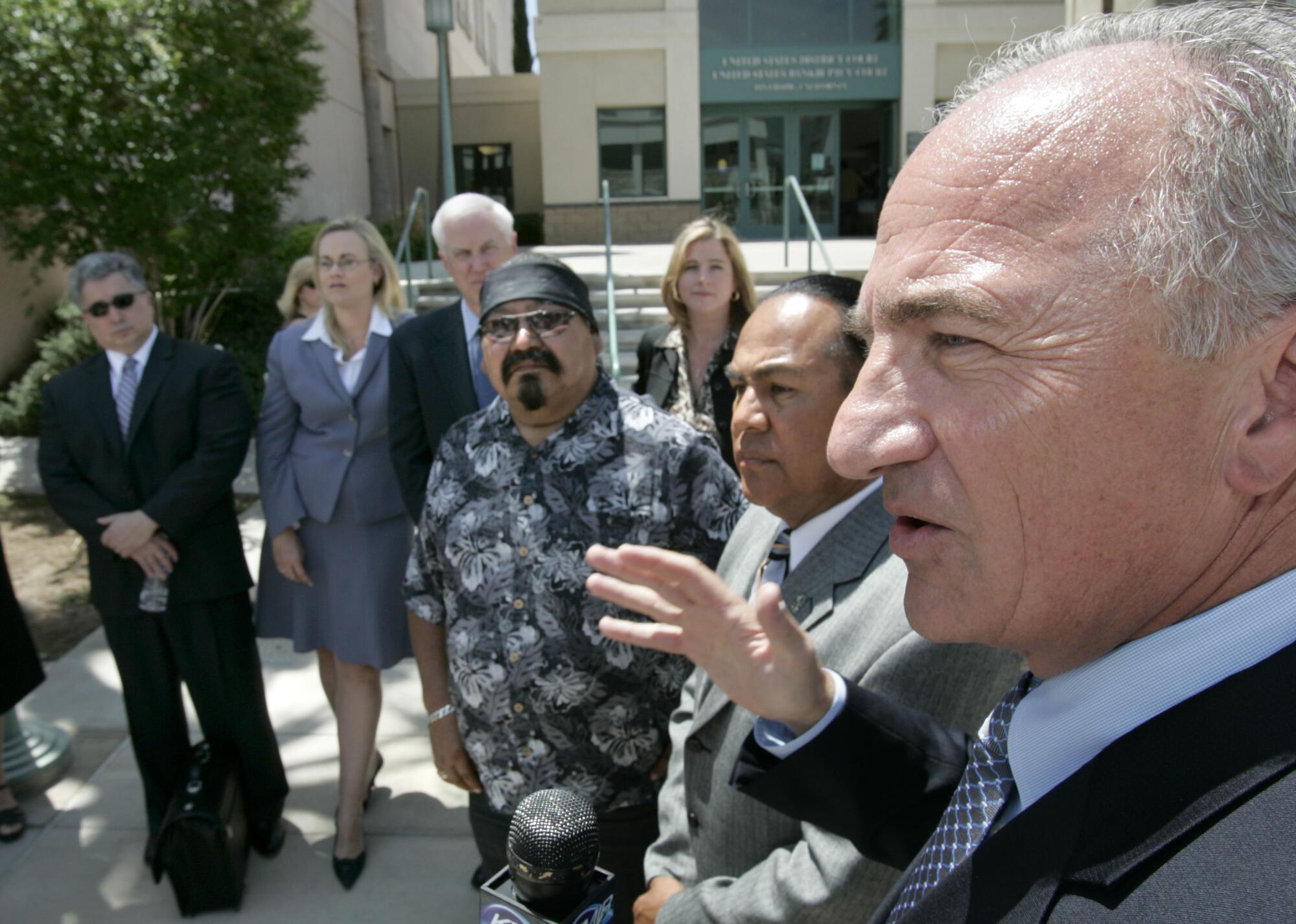
In multiple instances, judges and local governments have determined that Adams has padded staffing, increased his staff’s rates without informing the judge and engaged in duplicative billing — inflating his fees by six-figure amounts. A judge in one case likened Adams’ billing to a “feeding frenzy.”
Patricia Shawn, who has lived at Trails End for nearly three decades, said she initially was hopeful that Adams would improve conditions. Instead, she said, he was disdainful of tenants’ desire to remain in their homes and blamed him for their impending evictions.
“He’s ruined a lot of people’s lives here,” said Shawn, 59.
In an interview with The Times, Adams defended his record — noting that he’s taken on hard cases throughout his career, which makes criticism inevitable.
Adams argued that his firm has handled nearly 300 receiverships, more than anyone else in the state, and that cities and judges wouldn’t keep putting him in charge if he wasn’t getting results. He said he’s the only one with the expertise in contracting, property management and financing needed to handle the magnitude of his current assignment.
“There is nobody other than me, in California or anywhere in the United States, that would even have a chance of solving the problem at Skid Row Housing Trust,” Adams said.
The judge’s ruling comes two days after three people died of drug overdoses in an apartment unit at a Skid Row Housing Trust building, 649 Lofts.
An attorney who worked in mortgage finance, property management and public affairs, Adams was one of the leaders of a blue-ribbon committee that in the late 1990s examined slum housing in Los Angeles.
At the time, he came across an obscure state law that allows a judge to take over properties in deplorable circumstances where owners were unwilling or unable to make repairs. The court, through an appointed receiver, would have broad authority to fix the problems and abate any nuisances. The receiver generally finances the improvements — and his own fees — by borrowing off the property’s value and receiving first priority, ahead of any mortgages or other loans, to get paid back.
Adams created the California Receivership Group and has since taken over troubled properties stretching the length of the state.
While abating a nuisance, receivers act as the arm of the court and their first duty is to carry out the court’s orders. They typically also have fiduciary duties to the owners and creditors of the estate, and a responsibility to make the building habitable to tenants or find them housing elsewhere, said Richard Ormond, an attorney at Buchalter and former chair of the California Receivers Forum.
Receiverships can be messy affairs.
Some owners resist the idea of someone taking over their home or business and spending money on their behalf. Adams said he’s gotten death threats, and has had judges issue restraining orders to protect him and his staff.
And the tenants in troubled properties often face precarious living situations.
Following two fires, one fatal, at the Trails End Mobile Home Park and the formation of a large homeless encampment on its grounds in 2021, Fresno city officials asked a court to appoint Adams as receiver to clean things up.
From the start, Shawn said, Adams showed contempt for the roughly 150 people living there.
One time, he walked up to Shawn’s trailer and told her in front of his employees that her cluttered yard was a disgrace, and she should be ashamed.
“He said he was like a god here, he was like police … what he said is what goes,” Shawn said.
Adams denied making that statement to Shawn. He added that he regretted his brusqueness with her and other residents but needed rapid action to address fire risks and other dangers.
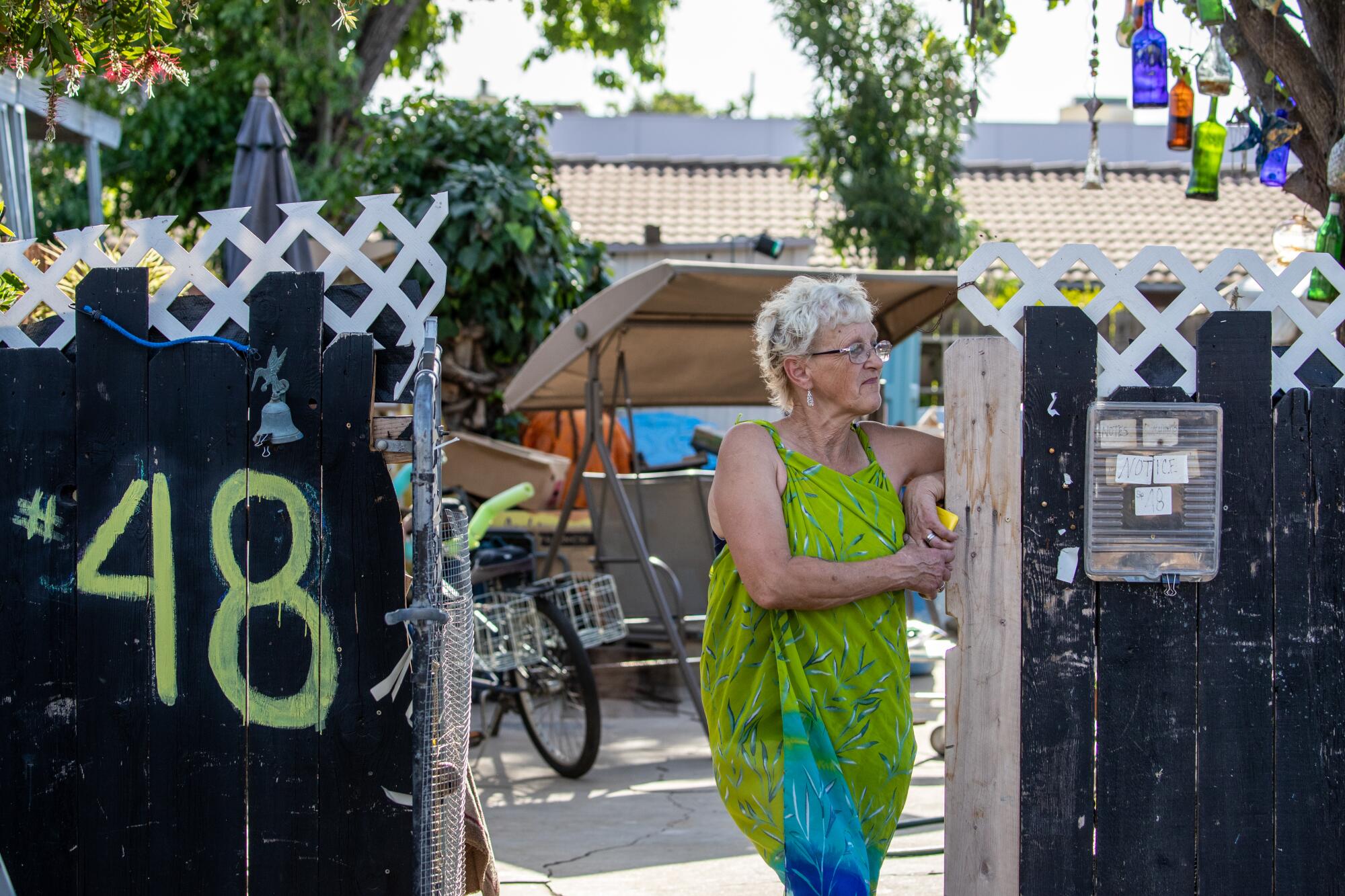
Ultimately, Shawn perceived that Adams was indifferent to whether residents could stay. They pleaded with him not to sell the property to Harmony Communities, a large mobile home park operator accused in the past of raising rents and squeezing low-income residents. Trails End tenants even tried to line up financing to purchase the park themselves.
But Adams recommended Harmony buy the property, and even brought in its contractors before the $1.7-million deal became official last May. Residents said in court declarations that Adams’ and Harmony’s employees together pushed them to accept buyouts and leave the park, warning that their trailers would likely be destroyed.
Since Harmony took over, it’s filed about a dozen eviction lawsuits and is threatening more, according to Mariah Thompson, an attorney with California Rural Legal Assistance, a nonprofit that is representing Shawn and other park residents. Last month, Harmony told residents the park would close next April.
“I don’t know where I’m going to go,” Shawn said. “I don’t have any family left. I planned on being here until I passed away — in my own little corner where I wasn’t bothering anybody.”
Adams’ firm received more than $500,000 in fees from the Fresno case, court filings show.
Adams said he would have entertained offers from tenants or nonprofits to purchase the property but nothing official ever came.
As far as tenants now facing eviction, Adams said he was convinced that local laws would prevent large rent increases and that, regardless, he’s not responsible for what happens after he leaves.
The park’s owner wanted to sell, Adams said, and he’s required to abate the nuisance while getting the best deal for the owner.
“My assignment there was to get that property remediated,” he said. “It was a filthy mess. I accomplished that.”
Some owners who have opposed Adams ended up destitute.
For years, neighbors in East L.A. complained about violence, drugs and gang activity on an 11,000-square foot lot with ramshackle dwellings and an auto repair shop located across the street from an elementary school. In 2018, L.A. County pursued a receivership, with Adams taking over the property owned by Mary Jacobs, her husband and a third party.

Jacobs, 73, has had a troubled life. She has bipolar disorder and uses methamphetamine. She fought Adams’ actions in court, mostly representing herself. Ultimately some of the buildings on the site were demolished, one of the homes was cleaned out and Adams sold the property for $550,000 in early 2020.
For his work, Adams billed $530,000 — nearly the entire amount from the sale — on top of the $275,000 he paid contractors to remediate the problems.
In a scathing November 2020 ruling, L.A. Superior Court Judge William F. Fahey upbraided Adams for repeatedly racking up more in fees than the judge had authorized.
Yes, Fahey wrote, Jacobs’ property was decrepit and dangerous, but she did not have the resources to fix the problems the way Adams did. Instead, Fahey found that Adams’ billing practices violated his responsibilities to Jacobs — with devastating consequences.
“The only reasonable conclusion is that the Receiver has put his financial interests first and expects that his request for additional fees will be rubber stamped,” Fahey wrote, noting that Jacobs had become homeless as a result of the case. Fahey denied more than $300,000 of Adams’ fees.
Jacobs, who lives in a residential hotel in Skid Row, blames Adams for her current circumstances.
“I would not have been homeless if not for him,” Jacobs said. “Anything I had of value has been taken from me. I have nothing.”
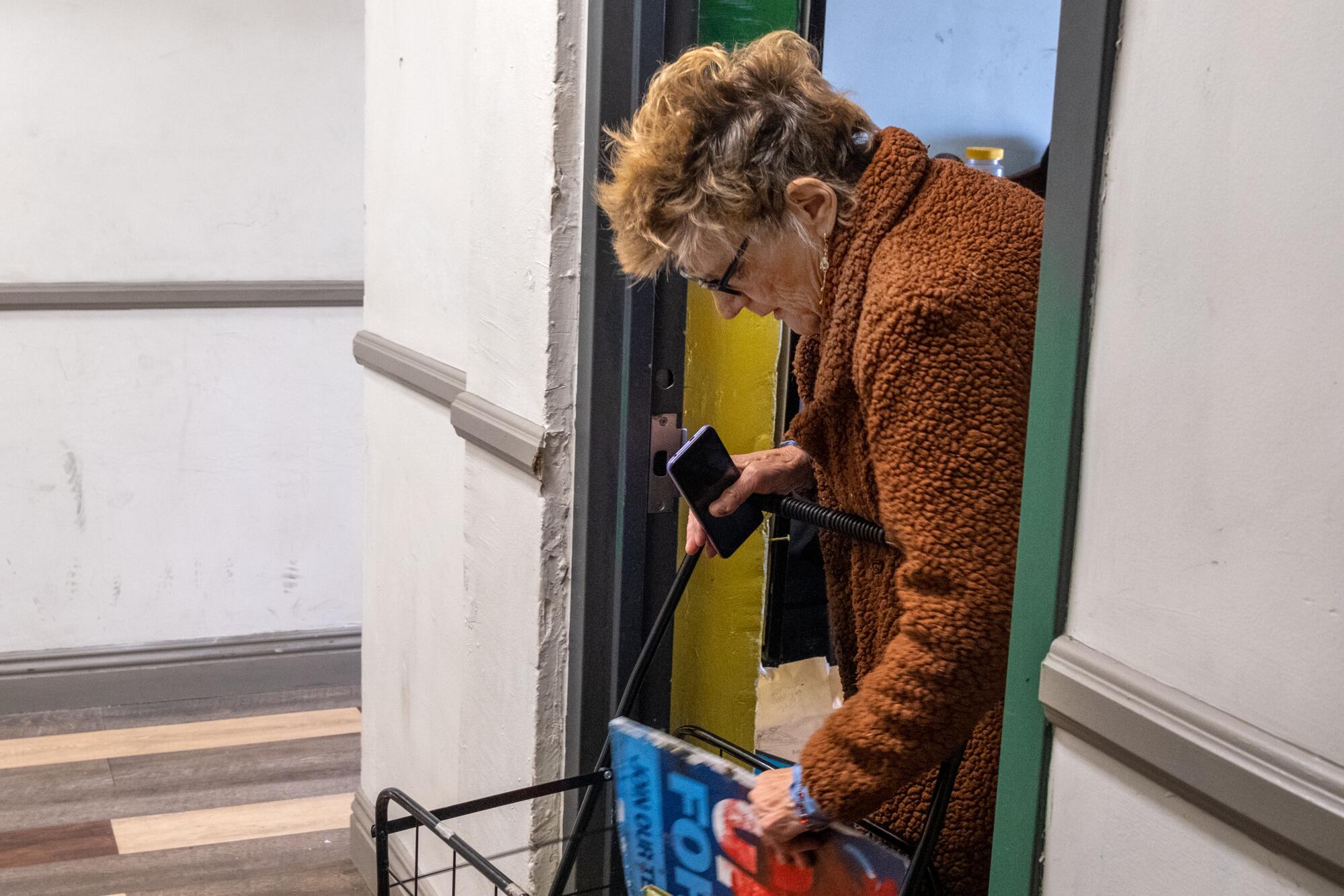
Adams denies he’s responsible for Jacobs’ problems, pointing out that she was ordered to vacate the property at the time he was appointed receiver.
Adams declined to comment on Fahey’s order, other than to disagree with the finding that he violated his duty to Jacobs and say he’ll never work with the judge again.
“It was a drug-infested den that had crooked contractors involved and now that’s all gone,” Adams said. “Even though [it] was just a very challenging case with the judge, it did have a happy ending.”
In the trust case, Adams is overseeing many tenants who have been homeless and suffer from mental health and drug problems. He will have significant sway over whether they will remain in the buildings.
Aside from the tenants’ vulnerability, the trust case presents complications beyond normal receiverships.
The Skid Row Housing Trust was a model for nonprofits housing homeless people in Los Angeles. Behind the scenes, it was imploding — leaving tenants in squalor.
The properties have a series of covenants and other rules ensuring they remain low-income housing, leaving little ability to increase their market value.
The city has proposed transferring the buildings to other nonprofits that have the resources to manage them properly. But many trust properties are more than a century old, and 15% of the nearly 2,000 units cannot be rented due to code violations. It could take years and millions of dollars to restore the entire portfolio.
When the cost of repairs and the receiver’s fees exceed the value of the property, the law holds the property owner responsible for the difference.
The trust, however, is on the brink of insolvency. Unable to make payroll, it laid off all its property management staff in the last two months.
Los Angeles housing officials have acknowledged that the city probably will end up paying some of the still-unknown cost.
So far, Adams has received authority to borrow $1.8 million to finance security and repairs at trust properties. Adams is expected to request additional funding at an L.A. Superior Court hearing scheduled for Wednesday.
The final cost will include payments to Adams and California Receivership Group, which staffs attorneys, paralegals and property managers. Adams has assigned 17 employees, including himself, to the trust matter, with hourly rates starting at $151.
In a declaration to the judge in the case, Adams said he was offering a 25% discount to the city on his fees. He told The Times he was still deciding if that would apply to his entire staff or just his own $465 an hour rate. He may reduce his own payments further, he said.
Judges in prior matters have noted California Receivership Group’s size allows it to deal with cases efficiently, but its fees can stack up quickly with little oversight.
“Because all of its administrative and legal services billings are ‘in house’ it gets to effectively bill itself for its legal and administrative expenditures and it gets to set the billing rates for all of its employees. What could go wrong with that?” wrote Robert F. Moody, a judge presiding over an Adams receivership in Mariposa County, in a 2022 ruling.
Moody found “accounting and billing irregularities” by Adams in the case, which stretched for 13 years, though the judge did not determine specific violations. Ultimately, Moody reduced Adams’ fees and costs by more than $300,000, according to court filings and attorneys for Mariposa County.
That ruling came after attorneys for the county, which had requested the receivership, objected to Adams’ accounting. In recent years, lawyers representing the cities of Duarte and Palmdale and L.A. County — in Jacobs’ case — have done the same.
The cases share common issues: Adams assigns a dozen or more employees work on a case, bills for multiple employees on the same task (including weekly internal meetings) and raises staffers’ rates without notifying the judge.
The judge in the Palmdale case rejected the city’s argument and approved Adams’ billings. But in the Duarte case, which involved a 28-unit apartment complex, Adams’ fees were reduced by over $100,000.
Adams maintains there was no wrongdoing in his accounting and all the firm’s activities were justifiable. But Adams said his firm no longer bills multiple people for the same task and he returns to the judge for approval prior to incurring expenses or raising individual staffer’s rates.
“We don’t need to be subject to that kind of criticism, so we’ve changed our practice,” Adams said.
Adams said he often forgoes fees to see receiverships through, sharing an internal spreadsheet saying that he is out $2.4 million in the seven cases highlighted by The Times. But he did not break down how much of that amount was billing that judges rejected.
Adams’ primary argument for his appointment in the trust matter was his experience.
“I served as a receiver on a large 26-building portfolio in Eureka, California, described as having ‘slumlord’ conditions,” Adams wrote in a March 29 sworn declaration to L.A. Superior Court Judge Mitchell L. Beckloff, who is presiding over the trust case. “I have the ability and resources to handle large, complex receiverships.”
Adams was named receiver in Eureka in 2011. He told The Times that he served in that role for three years.
But for nearly that entire period, court orders put the case on hold. In fact, Adams’ active appointment lasted just 20 days in total and a judge only approved Adams’ payment for receivership duties for those three weeks, court records show.
Adams removed himself from consideration for further work, he said in a court declaration, after the judge turned down some of his fees and while an ultimately unsuccessful trespassing lawsuit against him filed by the property owner was pending.
Adams said his reference to the Eureka receivership in the trust case was fair. He had done preliminary assessments of all 26 properties at issue and filled five filing cabinets with documents detailing needed repairs.
“We did the initial work [on Eureka], which is exactly what I’m doing right now,” he said.
Jeff Smith, the receiver who replaced Adams in Eureka, said Adams never turned over those documents and the work needed to be redone.
When asked by The Times, Los Angeles officials said they were unaware of concerns about Adams’ performance.
Feldstein Soto said that the trust’s failure demanded immediate action, and Adams was widely regarded as the most qualified receiver they could find. None of the public agencies, nonprofit interests, lenders and others involved in the case have raised issues about him, she said.
“He’s the only receiver in California, as far as I know, that has done anything remotely comparable in terms of his experience,” Feldstein Soto said. “He was the obvious choice.”
But, she said, her office didn’t formally vet his resume before recommending his appointment. Feldstein Soto said she wasn’t surprised that Adams had made enemies given the nature of his role. She said that the city planned to monitor his work.
“We’re watching him, having regular meetings with him,” she said. “We will hold Mark and everyone else in this case accountable.”
Perhaps the most consequential matter Adams was involved in was a 2007 case involving a sprawling migrant farmworker camp on Native American lands in the eastern Coachella Valley. He cites the case among the “notable achievements” on his resume.

The camp, named Duroville, housed thousands of indigenous people from Mexico and other indigent laborers in dirty, overcrowded slums in the desert. The smell of raw sewage permeated the property, packs of wild dogs roamed, makeshift electrical systems led to fires that destroyed residents’ trailers, drinking water was contaminated and a toxic waste dump sat next door.
U.S. District Judge Stephen Larson appointed Adams as Duroville’s receiver and assigned him to work with Pierre-Richard Prosper, a former senior diplomat in President George W. Bush’s administration, and Jack Shine, a local developer, to put together a plan for the park’s future.
Court appointee is upgrading Duroville and preparing a report on whether it should stay open.
Larson authorized the spending of $220,000 for the work of Adams, Prosper and Shine, and Adams personally secured a loan to that effect. But when Larson inspected Adams’ books, he found that while Adams had received his court-authorized amount, Shine was still owed $5,000 and Prosper $46,000.
Larson booted Adams from the job.
In court papers, Adams admitted that rather than paying Shine and Prosper, he had used $52,000 from the loan to reimburse himself for other work that the court had not yet approved.
Prosper declined to comment and Shine is deceased.
Adams told The Times that despite the court order he determined that Prosper and Shine were “worthless” and that money from the loan was needed for his work in Duroville instead.
“Did I think that I was entitled to get paid and they didn’t because they didn’t do anything? Yeah, that is what I thought,” Adams said.
By contrast, Adams described his efforts while receiver, which included securing the financing and making initial repairs to the sewage system, as “the heavy lifting” in the case.
Adams said he did not believe his administration of the loan resulted in his replacement, and that the judge simply wanted a change in leadership.
“It was a little bruising to me to have a judge say, ‘Well, we need to go in a different direction.’ But that’s what happened.”
Hard work continued at Duroville long after Adams had departed. In the four years after Adams’ removal, his successor — Tom Flynn — overhauled the entire electrical system, repaired constant sewer and water pipe breaks and faced regular threats of fire, disease and collapsed infrastructure, Flynn wrote in his final report.
Flynn and others also cobbled together the $28 million in federal, state, local and private funds to build the replacement housing for Duroville’s residents. Only when the new mobile home park opened in 2013 did Duroville shut down.
Adams “did some ‘heavy lifting’ in the beginning, but over the course of the project that was limited,” said Chris Hilton, a property manager at Duroville who worked under Adams and Flynn.
Larson later denied Adams’ request for another $239,000 in the case.

Yet the ramifications of Adams’ decisions at Duroville remained. The loan he had taken out, which carried an 8.5% interest rate, still needed to be repaid. The judge ordered the amount — ultimately $2,200 a month — come out of the funds that the property was earning largely through the farmworkers’ rents.
Adams said he regretted that the loan weighed on the property’s ledger while massive upgrades at Duroville were still required.
The circumstances caused a rift between Adams and the lender, Orange County-based Clearinghouse CDFI.
The U.S. Treasury Department-backed financial institution makes subsidized community improvement loans, and previously had provided Adams with a $2-million line of credit for work on numerous receiverships, said Douglas J. Bystry, the organization’s president and CEO.
But it wrote off nearly $200,000 for the Duroville loan, and had to do the same for two other loans that Adams also failed to repay around that time, Bystry said.
The organization hasn’t worked with Adams since.
“I’m disappointed that in previous loans to him and his company we weren’t made whole,” Bystry said.
Adams told The Times, however, that he’s now close to securing a loan with Clearinghouse CDFI for $5 million to finance upgrades to the trust properties.
“They’re 70% to 80% certain that they’re going to make that loan,” Adams said. “I am extremely proud of that.”
Bystry confirmed that his organization was considering such a loan, motivated by its mission to serve low-income communities. The firm is undergoing due diligence, including deciding if it is willing to do business with Adams again.
More to Read
Sign up for Essential California
The most important California stories and recommendations in your inbox every morning.
You may occasionally receive promotional content from the Los Angeles Times.
